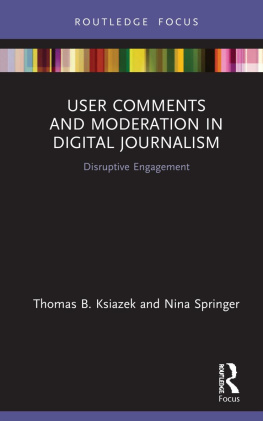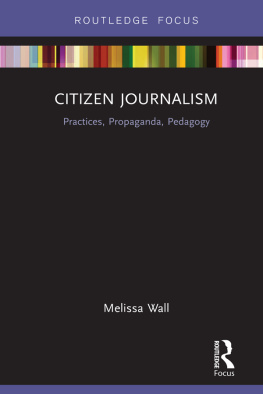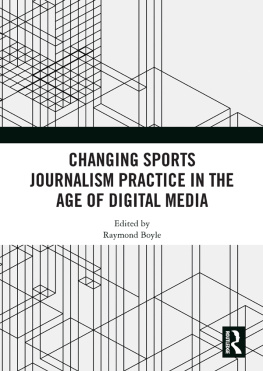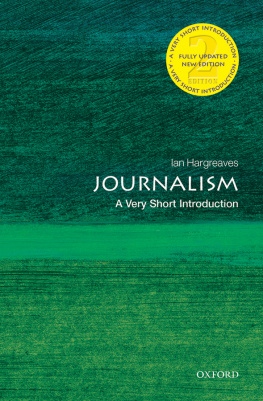
Journalism Education for the Digital Age
This book examines pressing debates concerning how and why journalism education should respond to digital changes in and around the industry, and questions market oriented ideology and civic responsibility in the field.
Surveying a broad field of discourse and research into journalism education, Creech shows how public ideals, market logics and industry concerns have come to animate discussions about digital journalism education and journalisms future, and how academic structures and cultures are positioned as a key obstacle to attaining that future. The book examines labor conditions, critiques of journalism education as an institution, and curricular change, with reference to how conversations around race, fake news, and digital infrastructures impact the field. Creech argues for a critical pedagogy of journalism education, one that pushes beyond jobs training and instead is centred around a commitment to public and civic value via a liberal arts tradition made practicable for the digital age.
This insightful book is vital reading for journalism educators and scholars, as well as journalists and news executives, education scholars, and program officers and decision-makers at journalism-adjacent foundations and think tanks.
Brian Creech is an Associate Professor in the Journalism Department at Temple Universitys Lew Klein College of Media and Communication, in Philadelphia, Pennsylvania. He is also a member of the faculty in the schools Media and Communication Ph.D. program and directs the schools teaching hospital-style journalism capstone, PhiladelphiaNeighborhoods.com, which produces hyperlocal news for and about underserved communities in Philadelphia.
Disruptions: Studies in Digital Journalism
Series editor: Bob Franklin
Disruptions refers to the radical changes provoked by the affordances of digital technologies that occur at a pace and on a scale that disrupts settled understandings and traditional ways of creating value, interacting and communicating both socially and professionally. The consequences for di-gital journalism involve far reaching changes to business models, profes-sional practices, roles, ethics, products and even challenges to the accepted definitions and understandings of journalism. For Digital Journalism Studies, the field of academic inquiry which explores and examines digital journalism, disruption results in paradigmatic and tectonic shifts in scholarly concerns. It prompts reconsideration of research methods, theoretical ana-lyses and responses (oppositional and consensual) to such changes, which have been described as being akin to a moment of mind-blowing un-certainty.
Routledges new book series, Disruptions: Studies in Digital Journalism, seeks to capture, examine and analyse these moments of exciting and ex-plosive professional and scholarly innovation which characterize develop-ments in the day-to-day practice of journalism in an age of digital media, and which are articulated in the newly emerging academic discipline of Digital Journalism Studies.
Disrupting Investigative Journalism
Moment of Death or Dramatic Rebirth?
Amanda Gearing
Journalism Education for the Digital Age
Promises, Perils, and Possibilities
Brian Creech
For more information, please visit: www.routledge.com/Disruptions/book-series/DISRUPTDIGJOUR
Journalism Education for
the Digital Age
Promises, Perils, and Possibilities
Brian Creech
First published 2021
by Routledge
2 Park Square, Milton Park, Abingdon, Oxon OX14 4RN
and by Routledge
605 Third Avenue, New York, NY 10158
Routledge is an imprint of the Taylor & Francis Group, an informa business
2021 Brian Creech
The right of Brian Creech to be identified as author of this work has been asserted by him in accordance with sections 77 and 78 of the Copyright, Designs and Patents Act 1988.
All rights reserved. No part of this book may be reprinted or reproduced or utilised in any form or by any electronic, mechanical, or other means, now known or hereafter invented, including photocopying and recording, or in any infor-mation storage or retrieval system, without permission in writing from the publishers.
Trademark notice: Product or corporate names may be trademarks or registered trademarks, and are used only for identification and explanation without intent to infringe.
British Library Cataloguing-in-Publication Data
A catalogue record for this book is available from the British Library
Library of Congress Cataloging-in-Publication Data
Names: Creech, Brian, author.
Title: Journalism education for the digital age : promises, perils, and possibilities / Brian Creech.
Description: Abingdon, Oxon ; New York, NY : Routledge, 2021. | Series: Disruptions : studies in digital journalism | Includes bibliographical references and index. |
Identifiers: LCCN 2021006251 (print) | LCCN 2021006252 (ebook) | ISBN 9780367359881 (hardback) | ISBN 9781032047621 (paperback) | ISBN 9780429343094 (ebook)
Subjects: LCSH: Journalism--Study and teaching. | Online journalism--Study and teaching. | Journalists--Training of. | Journalism--Technological innovations.
Classification: LCC PN4785 .C74 2021 (print) | LCC PN4785 (ebook) | DDC 070.407--dc23
LC record available at https://lccn.loc.gov/2021006251
LC ebook record available at https://lccn.loc.gov/2021006252
ISBN: 978-0-367-35988-1 (hbk)
ISBN: 978-1-032-04762-1 (pbk)
ISBN: 978-0-429-34309-4 (ebk)
Typeset in Times New Roman
by MPS Limited, Dehradun
Contents
Introduction
1 Who can say what about journalism education?: Institutional actors and fields of discourse
2 Training for precarity: Skills education and journalism crises
3 Disrupting j-school: Academic culture as an obstacle to innovation
4 Pedagogical visions of digital success: Program philosophies and curricular change
5 Educating journalists for a digital culture: Facing the central problems of the current era
Bibliography
Index
I would like to begin by thanking Bob Franklin, who got this project started with a simple e-mail and some well-worded questions. The Disruptions book series has been an inspiration, and I am proud to be a part of it. I would also like to express my sincerest gratitude to Andrew Mendelson, who stopped by my office at Temple after we both attended the Online News Association conference in Atlanta in 2013, and remarked that the way folks there talked about technology in journalism seemed too uncritical and indicative of a trend in the industry and the academy. Andy was my department chair when I started my career, and though hes deeply ensconced in administration elsewhere, his ideas, encouragements, and even off-hand comments continue to seed inspiration in my own career.
I have been truly blessed with great colleagues, both at Temple and across the academy. I am most indebted to my department colleagues, who have strived to build a community focused on building a better future for journalism and journalism education: Jillian Bauer-Reece, Magda Konieczna, Logan Molyneux, Soomin Seo, and Andrea Wenzel. May we all be lucky enough to find ourselves surrounded by such inspiring teachers and researchers. I have also been fortunate to receive the insight of two great mentors, Carolyn Kitch and Fabienne Darling-Wolf, who, in their wisdom, have always found ways to create an environment of true intellectual engagement and scholarly aspiration. We are all supported by a great set of administrators: Deb Cai, David Mindich, and Patrick Murphy, as well as our dean, David Boardman. There is a strong community of critical researchers here, but I am especially grateful to my colleague Devon Powers, who pushes us all towards greater rigor and clarity.








